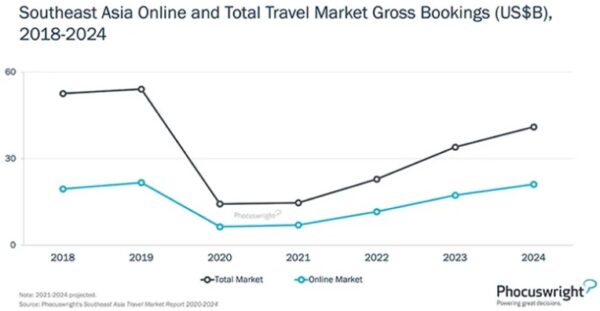
In an era where environmental consciousness is at the forefront of global concerns, the travel and hospitality industry in Southeast Asia is undergoing a conscious evolution towards sustainability. United Nations World Tourism Organisation (UNWTO) anticipates the Southeast Asian Nations’ growth of international tourist arrivals to be 152 million in 2025, and 187 million by 2030.

Source: Sustainable Tourism Market Snapshot (2022 to 2032), Future Market Insights
As travellers push for more accountability from brands, they are also aware of how their own choices can make a difference. This shift not only aligns with the growing eco-awareness of travellers but also presents a unique set of investment opportunities for venture capitalists eager to support businesses committed to ethical and responsible practices in this vibrant and diverse region.
What is sustainable travel?
Sustainable travel can be described as protecting the environment, counteracting climate change, helping build a society without exploitation and helping to stop the separation of rich and poor. During Q4 of 2023, Booking.com unveiled 53% of global travellers look for accommodation with a wow-factor sustainability innovation.
A sustainable traveller is no longer viewed as an eco-warrior. Today, they are known to care for wildlife, be eco-conscious, and be highly conscious of not negatively impacting the local people and environment.
According to the ASEAN Tourism Strategic Plan 2016-2025 (produced by the Philippine Department of Tourism with technical assistance from the United States Agency for International Development), the regional bloc has pledged that by 2025, it would “be a quality tourism destination offering a unique, diverse ASEAN experience, and will be committed to responsible, sustainable, inclusive and balanced tourism development, so as to contribute significantly to the socioeconomic well-being of ASEAN people.”
Online bookings for travel are anticipated to continue improving and technology advancements remain desirable for customer service experience. PhocusWire notes gross travel bookings in 2024 for Southeast Asia are forecasted to reach $41 billion, with more than 50% made online.

Source: Southeast Asia Travel Market Report 2020-2024, PhocusWright
As the global population continues to become more tech-savvy, the usage of the internet and smartphones increases. The easy to access and use technology has created a fertile ground for start-ups to grow and increase ways of attracting and connecting with a global audience.
The experiential Traveler of the future
2023 AMEX Global Travel Trends Report highlights:
- 46% of Gen Z and Millennial plan to spend more on experiences like travel, instead of goods.
- 84% of Gen Z and Millennials prefer to have a dream vacation than purchase a new luxury item.
- around 82% of Gen Z and Millennial travellers are interested in holidays with minimal environmental impact, compared to 72% of Gen X and 64% of Boomers.
Southeast Asia businesses investing in eco-friendly accommodations and eco-adventure activities help conserve nature or provide cultural immersions will be attractive to a greater number of visitors, compared to the traditional hotel experience. These sustainable initiatives attract tourists and support the global sustainability movement whilst nurturing unique ecosystems and characteristics of Southeast Asian destinations.
Some examples are –

Zeavola resort in Thailand, promotes local tours, PADI diving, and experienced divers can help the resort team with coral conservation – as of mid 2023, over 10,000 coral fragments had been replanted.

The Gibbon Experience in Laos, created a tourism-based conservation program – allowing childhood fantasies of waking surrounded by gibbons, to come true.

Farmhouse Smiling Gecko in Cambodia, is a resort with farming and craft workshops, a unique school, and tours that provide deeper insights into the everyday lives of the local people.
These businesses are explementary in their sustainable focus, as not only do they contribute to the global sustainability movement – they also support, protect, and reflect the unique characteristics of Southeast Asian destinations. Such established businesses will attract and retain the attention of a global audience, to the region.
What is sustainability-focused investing?
As travellers and consumers’ decision-making process includes environmental and social impacts, businesses and start-ups aligned to these values are increasingly becoming popular. Investors recognise the longer-term viability of investing in sustainability-focused start-ups, with entrepreneurs developing processes and technologies that have the potential to create cutting-edge innovation and become industry leaders.
Southeast Asia is recognised as a hub for start ups, particularly involving technology. Hyphen Partners article reflects and identifies the 2023 trends to include a strong focus on deep tech involving artificial intelligence, quantum computing, biotechnology and climate technology.
Investors may recognise investment opportunities with starts ups focusing on:
- Preserving a region’s biodiversity,
- Supporting local communities,
- Reducing food waste,
- Streamlining operations and increasing productivity,
- Sustainable transportation solutions,
- Reducing greenhouse gases via renewable energies or other technologies,
- Climate impact measurement and management.
When displaying an ability for productivity acceleration, a start-up will leave a lasting impression due to its ability to capture market growth ahead of competitors. This may appear as entrepreneurs utilising technology, automation, or a new capacity to develop and grow their business.
Climate impact measurement and reporting
Asia-Pacific is identified as one of the most vulnerable regions for climate change, as it accounts for nearly half of global greenhouse gas emissions. Investors are becoming more interested in receiving sustainability reports. However, not all entrepreneurs are prepared to measure and communicate their contributions.
Climate impact measurement and management can be complex or confusing due to the many frameworks, principles, and metrics. Measuring the Impact of Climate Small and Growing Businesses: A walk-through of impact tools, frameworks and best practices, describes how “there is currently no standardization of climate impact reporting in the small business sector, leaving the burden on entrepreneurs to grow a successful business and implement the right tools to measure climate impact. Impact investors and entrepreneur support organizations likewise struggle to understand, use, and deploy climate metrics cost-effectively.”
Challenges faced by entrepreneurs include:
- Understanding the impact metric frameworks.
- Identifying a single or set of indicators that reflect their mission, especially if climate impact reporting is not included in the business model.
- Individual or team understanding of how to measure data and identify best practices.
- Capturing the data accurately.
Throughout Southeast Asia, various grants, incentives and programs have been implemented to attract investors and provide support to start-ups. An incentive to help start-ups learn and navigate climate impact measurement and reporting is something to be developed and promoted.
A broad sustainability framework that is readily recognised and tools provided to aid understanding is the United Nations Sustainable Development Goals (SDGs). The 17 Goals promote prosperity whilst protecting the planet. Entrepreneurs can select from a provided set of Key Performance Indicators and report their contributions whilst maintaining alignment with their mission.
Success story from Southeast Asia
Trip Guru is a success story for prioritizing environmental and social responsibility in the travel and hospitality sector – supporting small businesses, local communities, and helping protect diverse environments.
In 2015, Trip Guru was founded by Sebastian Renzacci and Francesco Piccolo, two young professionals relating to how travelling around another country was exciting and a daunting or lonely challenge. This is something they believed could be changed with a community-focused approach with a strong eco-friendly focus.
Trip Guru was developed in Bali, with Sebastian and Francesco forming a long-lasting partnership with Oky, an Indonesian travel guide. After creating success in Bali, local guides were sought after across the globe to share local knowledge, commitments to sustainable tourism and a strong sense of ethical travel.
Trip Guru has evolved from two employees to over 1,000 curated experiences, across 40 destinations, in 14 countries. The experiences provided are positively recognised with more than 25,000 verified reviews with a 94% satisfaction score and the future continues to appear bright.
Conclusion
The sustainable tourism landscape in Southeast Asia is not just an ethical choice but a strategic investment opportunity. The region holds immense potential now and in the future for venture capitalists seeking both financial returns and positive social impact. The growing wave of eco-conscious travellers, coupled with the region’s commitment to responsible and sustainable tourism presents a unique set of opportunities.
